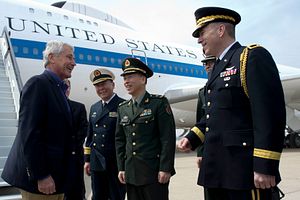U.S. Secretary of Defense Chuck Hagel arrived in China today, and was granted a rare opportunity to tour China’s lone aircraft carrier. Hagel was reported to be the first foreign defense official to visit the Liaoning, stationed in Qingdao. A senior defense official told Reuters that the U.S. saw the gesture as “an honest, genuine effort to be open about this brand new capability that they’re trying to develop.” The tour of Liaoning was a bright spot of cooperation in what could be a rather rocky visit.
Hagel comes to China with a wealth of issues to discuss, many of which see the U.S. and China increasingly entrenched on opposing sides. On the issue most ripe for cooperation, preventing North Korea from becoming a nuclear power, the U.S. and China have a fundamental disagreement on how best to proceed. Beijing is pushing for a return to negotiations, likely under the framework of the Six Party Talks, while the Obama administration has made clear it wants North Korea to take concrete steps to denuclearize before reentering negotiations.
On other issues, the U.S. and China have even less in common. The U.S. is keeping a wary eye on China’s actions in the East and South China Sea, where U.S. allies Japan and the Philippines are two of the most vocal parties in maritime disputes with China. From China’s announcement of an air defense identification zone (ADIZ) last winter to the Philippines’ international arbitration case, the U.S. and China have consistently taken opposing positions on new developments in those disputes. Though both countries profess a desire to maintain stability and maritime security in East and Southeast Asia, it’s clear that (as with North Korea) the two countries have opposing ideas on how to achieve those goals.
Still, Hagel traveled to China hoping to make some progress, if not on the issues, then on developing closer military-to-military communications and relations. Department of Defense Press Secretary Rear Admiral John Kirby told reporters that Hagel “will emphasize the importance of building trust, increasing openness and transparency and upholding international norms throughout his trip.”
Back in August, when China’s Minister of National Defense General Chang Wanquan met with Hagel in Washington, a senior DoD official told reporters that the U.S. “is looking for ways to sustain substantive dialogue on a range of issues between our two militaries where we can expand opportunities for practical cooperation.” Such mil-to-mil relationship building has been a priority for Obama, especially as the U.S. seeks to reduce tensions with China resulting from its rebalance to Asia.
However, Hagel’s tour to China would be hard-pressed to result in any increased cooperation between the two, particularly as Hagel first visited China’s main regional rival, Japan. While in Tokyo, Hagel met with Prime Minister Shinzo Abe as well as Japanese Defense Minister Itsunori Onodera and Foreign Affairs Minister Fumio Kishida. Upon arriving in Tokyo, Hagel told reporters, “The Japanese-American partnership is a very critical anchor to peace and stability and security in this part of the world.”
According to a senior defense official traveling with Hagel, during the visit Hagel was expected to speak with Japanese leaders about furthering U.S.-Japan military cooperation, including revising Japan’s defense guidelines. China already responded suspiciously to Japan’s recent move to loosen restrictions on arms exports, while the U.S. praised Japan for the decision. Should Abe’s government move forward with an official acknowledgement of Japan’s right to collective self-defense, the reactions from both China and the U.S. would likely be even more pronounced—in opposite directions. China has repeatedly warned against Abe returning to Japan’s militaristic past, while the U.S. has made it clear it would welcome an increased security commitment from its ally.
According to Japan’s Foreign Ministry, during Hagel’s meeting with Abe the two men reiterated their joint support for Japan’s new defense policies and the U.S. rebalance to Asia, two policies that bedevil Beijing. The two also discussed China and Ukraine, and “confirmed that any attempt to unilaterally change the status quo through the use of coercion and intimidation is completely unacceptable”—a position that (by design) applies equally well to both China’s actions in the East and South China Seas and to Russia’s actions in Ukraine.
In the latest sign of tensions between Japan and China, China has not invited Japan to participate in the symbolic international fleet review that will take place during the Western Pacific Naval Symposium. In response, the U.S. has declined its invitation to participate, although U.S. officials will observe the review and participate in the rest of the symposium.
As the case of the WPNS fleet review shows, the U.S. has only tightened its ties to Japan in response to worsening ties between Beijing and Tokyo. During a press conference with his Japanese counterpart, Hagel announced that the U.S. will forward-deploy two additional Aegis ships to Japan by 2017. Though Hagel explicitly tied that move to “Pyongyang’s patterns of provocative and destabilizing actions,” Beijing will likely view such a move as targeting China, not North Korea.

































